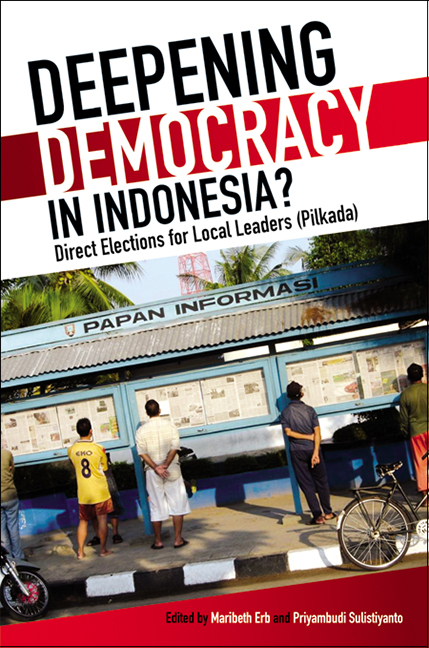Book contents
- Frontmatter
- Dedication
- Contents
- List of Tables
- List of Figures
- Contributors
- Acknowledgements
- Glossary
- 1 Indonesia and the Quest for “Democracy”
- 2 Pilkada Langsung: The First Step on the Long Road to a Dualistic Provincial and District Government
- Part I Political Parties, Politician Elites and the Voters
- 3 Political Parties in Pilkada: Some Problems for Democratic Consolidation
- 4 Batam's 2006 Mayoral Election: Weakened Political Parties and Intensified Power Struggle in Local Indonesia
- 5 The Rising Importance of Personal Networks in Indonesian Local Politics: An Analysis of District Government Head Elections in South Sulawesi in 2005
- 6 Pilkada, Money Politics and the Dangers of “Informal Governance” Practices
- 7 Electing District Heads in Indonesia: Democratic Deepening or Elite Entrenchment?
- 8 Gender and Reform in Indonesian Politics: The Case of a Javanese Woman Bupati
- 9 Pilkada in Bantul District: Incumbent, Populism and the Decline of Royal Power
- Part II Media and Campaigns: Comparing Local and National Elections
- Part III Conflict, Ethnicity, and Political Divisions
- Index
4 - Batam's 2006 Mayoral Election: Weakened Political Parties and Intensified Power Struggle in Local Indonesia
from Part I - Political Parties, Politician Elites and the Voters
Published online by Cambridge University Press: 21 October 2015
- Frontmatter
- Dedication
- Contents
- List of Tables
- List of Figures
- Contributors
- Acknowledgements
- Glossary
- 1 Indonesia and the Quest for “Democracy”
- 2 Pilkada Langsung: The First Step on the Long Road to a Dualistic Provincial and District Government
- Part I Political Parties, Politician Elites and the Voters
- 3 Political Parties in Pilkada: Some Problems for Democratic Consolidation
- 4 Batam's 2006 Mayoral Election: Weakened Political Parties and Intensified Power Struggle in Local Indonesia
- 5 The Rising Importance of Personal Networks in Indonesian Local Politics: An Analysis of District Government Head Elections in South Sulawesi in 2005
- 6 Pilkada, Money Politics and the Dangers of “Informal Governance” Practices
- 7 Electing District Heads in Indonesia: Democratic Deepening or Elite Entrenchment?
- 8 Gender and Reform in Indonesian Politics: The Case of a Javanese Woman Bupati
- 9 Pilkada in Bantul District: Incumbent, Populism and the Decline of Royal Power
- Part II Media and Campaigns: Comparing Local and National Elections
- Part III Conflict, Ethnicity, and Political Divisions
- Index
Summary
INTRODUCTION
Since the 1998 collapse of Soeharto's New Order regime, Indonesia has seen rapid and fundamental changes in its political institutions. Simultaneous processes of democratic reform and administrative decentralization have transformed the country's once centralized, authoritarian political system into a more decentralized and democratic one. At the core of democratic reforms has been the introduction of competitive elections and, during the last ten years, Indonesia has successfully staged two general elections (in 1999 and 2004) as well as its first-ever direct presidential election (in 2004). Administrative decentralization has also been a key dimension of political change. In January 2001, two laws on regional autonomy devolved a wide range of power and authority to the regions.
In Indonesia and internationally, many advocates of political reform suggest political decentralization is an effective way to consolidate democracy. In September 1999, Indonesia's local assemblies recovered their right to elect and dismiss local government heads. While the elections of local government heads by Local Assembly members decentralized Indonesia's politics, the character and results of those elections were complex and controversial. The indirect local elections fuelled a rash of “money politics” at the local level, in which party representatives in local assemblies effectively sold their votes to candidates regardless of their parties’ official lines.
In 2002, responding to criticisms from domestic and international organizations and in an effort to achieve consistency with the amended constitution, the National Assembly adopted a direct election system for local government heads. In June 2005, the Indonesian government commenced another important step towards more decentralized politics by holding direct elections for local government heads — i.e., provincial governors, district regents (bupati), and municipal mayors (walikota). From June 2005 to September 2007, sixteen gubernatorial and over 280 regent and mayoral elections were held. Over the next couple of years, the remaining provinces, districts, and municipalities will hold similar elections. This essay examines how Indonesia's experiment with direct local elections has affected local political dynamics and governance in a single locality. It does so through an analysis of a mayoral election on the island of Batam in the Riau Archipelago.1
- Type
- Chapter
- Information
- Deepening Democracy in Indonesia?Direct Elections for Local Leaders (Pilkada), pp. 74 - 100Publisher: ISEAS–Yusof Ishak InstitutePrint publication year: 2009

